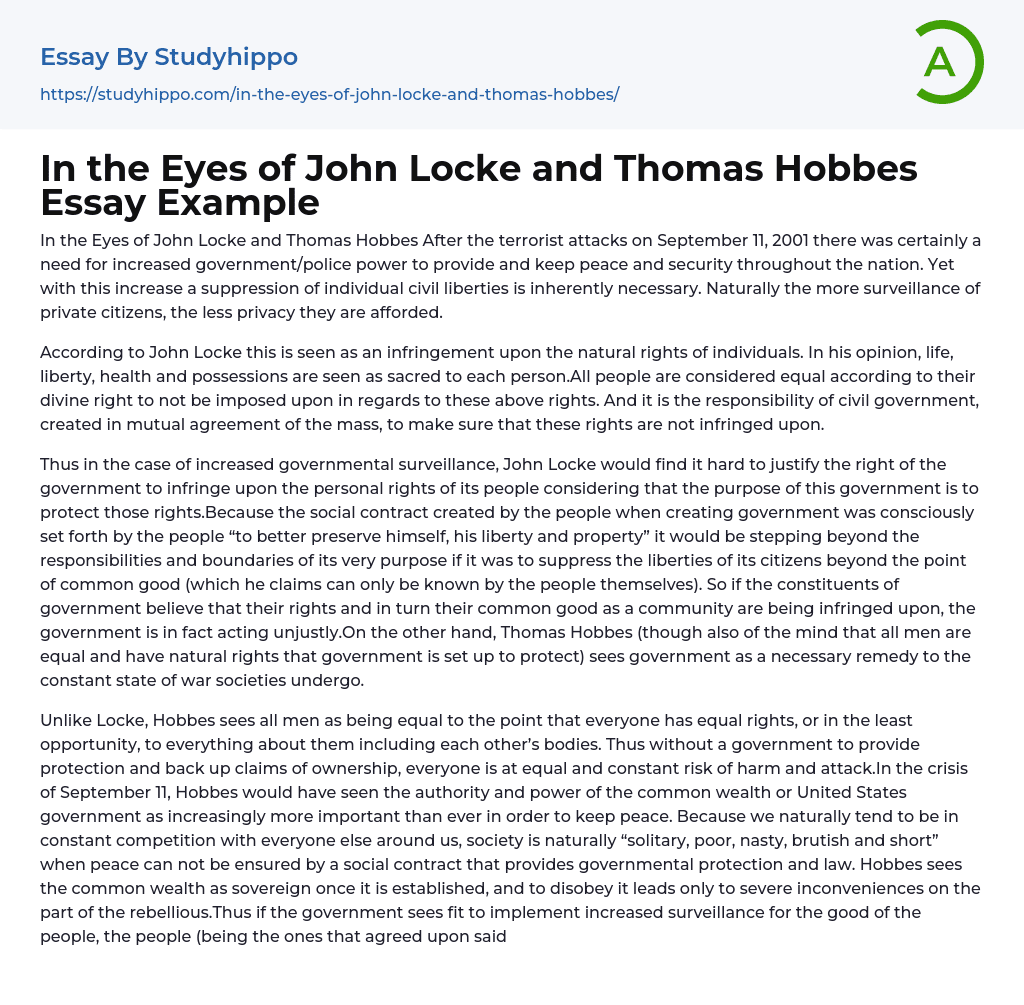

In the Eyes of John Locke and Thomas Hobbes Essay Example
After analyzing the perspectives of John Locke and Thomas Hobbes, it becomes evident that the aftermath of the September 11th terrorist attacks required a boost in government and police authority to uphold peace and security across the country. Nonetheless, this amplified power ultimately causes a restriction on personal civil liberties. Consequently, enhanced surveillance of ordinary citizens unavoidably leads to diminished privacy for these people.
John Locke believes that violating the fundamental rights of individuals is a violation of their natural rights. He regards life, freedom, well-being, and property as sacred to each person. Every individual is considered equal in terms of their God-given entitlements to these rights. It is the duty of the civil government, established through a collective consensus, to ensure that these rights are not transgressed.
John Locke would question the justification of increased g
...overnmental surveillance and infringement upon personal rights, as the purpose of government is to protect said rights. The social contract, established by the people to preserve individual liberty and property, would render government overstepping its boundaries by suppressing citizen liberties beyond the common good. This good can only be recognized by the people themselves. If such infringement occurs, government acts unjustly. In contrast, Thomas Hobbes views government as a necessary remedy to the constant state of war societies experience, although he shares Locke's belief in natural rights that government serves to protect.
Hobbes' view differs from Locke's in that he believes all individuals to be equal, with the same rights and opportunities to everything, including each other's bodies. Without a government to protect and back claims of ownership, everyone is at equal risk of harm and attack, making society "solitary
poor, nasty, brutish, and short." In the September 11 crisis, Hobbes would have seen the United States government's authority and power as increasingly vital for maintaining peace. Once established, Hobbes views the commonwealth as sovereign, and disobedience leads only to significant inconvenience. Thus, if the government deems it necessary to increase surveillance for the benefit of society, the people who agreed upon said government must obey its decrees.
According to Hobbes, the sacrifice made during the creation of the social contract was viewed by the people as necessary for their protection and would support increased governmental surveillance to maintain peace.
- Activism essays
- Communism essays
- Conservatism essays
- Liberalism essays
- Marxism essays
- Nationalism essays
- Patriotism essays
- Policy essays
- Public Policy essays
- Social Contract essays
- Socialism essays
- Totalitarianism essays
- Albert Camus essays
- Aristotle essays
- Carl Jung essays
- Henry David Thoreau essays
- Immanuel Kant essays
- John Dewey essays
- Karl Marx essays
- Machiavelli essays
- Michel Foucault essays
- Plato essays
- Rene Descartes essays
- Rousseau essays
- Socrates essays
- Thomas Hobbes essays



